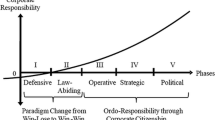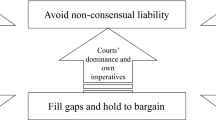Abstract
Due to the domain characteristics of business ethics, a contractarian theory for business ethics will need to be essentially different from the contract model as it is applied to other domains. Much of the current criticism of contractarian business ethics (CBE) can be traced back to autonomy, one of its three boundary conditions. After explaining why autonomy is so important, this article considers the notion carefully vis à vis the contracting partners in the contractarian approaches in business ethics. Autonomy is too demanding a condition for the realm of CBE. But a less stringent version of the contract may be possible, a version which uses the contract as a heuristic device, which merely requires moral responsibility. Furthermore, it is argued that views of (human) agency and the moral subject should be made explicit in such a theory.
Similar content being viewed by others
References
Anderson E. (2000) Beyond Homo Economicus: New Developments in Theories of Social Norms. Philosophy & Public Affairs 29: 170–200
Anshen, M.: 1970, ‘Changing the Social Contract: A Role for Business’, The Columbia Journal of World Business 5, 6; Reprinted in Beauchamp, T. and N. Bowie: 2000, Ethical Theory and Business (Prentice-Hall, Englewood Cliffs, NJ), pp. 97–103
Baier A. (1985) Postures of the Mind. University of Minnesota Press, Minneapolis MI
Bauman Z. (1993) Postmodern Ethics. Blackwell, Oxford
Beauchamp T. (1991) Philosophical Ethics. McGraw-Hill, New York NY
Donaldson T. (1982) Corporations and Morality. Prentice-Hall, Englewood Cliffs NJ
Donaldson, T. and T. Dunfee: 1994, Toward a Unified Conception of Business Ethics: Integrative Social Contract Theory. Academy of Management Review 10: 252–284
Donaldson T., and Dunfee T. (1999) Ties that Bind. Harvard Business Press, Boston MA
Du Gay P. (1996) Consumption and Identity at Work. Sage, London
Dunfee T. (1991) Business Ethics and Extant Social Contracts. Business Ethics Quarterly 1: 23–51
Foot Ph. (1972), Morality as a System of Hypothetical Imperatives. Philosophical Review 81: 305–316
Foucault M. (1977) Discipline and Punish: The Birth of the Prison. Vintage, New York NY
French P. (1984) Collective and Corporate Responsibility. Columbia University Press, New York NY
Gilbert M. (1992), On Social Facts. Princeton University Press, Princeton NJ
Graaf G. de (2003), Tractable Morality Customer Discourses of Bankers, Veterinarians and Charity Workers. Erim, Rotterdam
Hampsher-Monk I. (1992), A History of Modern Political Thought. Blackwell, Oxford
Hampton J. (1993) Contract and Consent. In: Goodin E., Pettit P. (eds), A Companion to Contemporary Political Philosophy. Blackwell, Oxford
Heugens, P., van Oosterhout H., and Kaptein M. (2004) Contractarian Business Ethics: Theory in Search of Applications, Journal of Business Ethics 52(2): iii
Hobbes T. (1991), Leviathan. Cambridge University Press, Cambridge
Kant I. (2002) Groundwork for the Metaphysics of Morals. Yale University Press, New Haven CT
Kaptein M. and Wempe J. (2002) The Balanced Company. Oxford University Press, Oxford
Keeley M. (1988) A Social-Contract Theory of Organizations. University of Notre Dame Press, South Bend IN
Kymlicka W. (1990) Contemporary Political Philosophy. Oxford University Press, Oxford
Locke J. (1988), Two Treatises of Government. Cambridge University Press, Cambridge
March J. and Olsen J. (1989), Rediscovering Institutions. The Free Press, New York NY
Mumford, L.: 1970, The Pentagon of Power. The Myth of the Machine, Vol. II (Harcourt Brace Jovanovich, San Diego, CA)
Nietzsche F. (1989) On The Genealogy of Morals. Vintage Books, New York NY
Nietzsche F. (1990), Beyond Good and Evil. Penguin Books, London
Rawls J. (1971). A Theory of Justice. Oxford University Press, Oxford
Rogers H., Ogbuehi A., Kochunny C. (1995) Ethics and Transnational Corporations in Developing Countries. Journal of Euromarketing 4(2): 11–38
Scanlon T. (1998) What We Owe to Each Other. Harvard University Press: Cambridge MA
Schermer, M.: 2001, The Different Faces of Autonomy. Thesis University of Amsterdam, Amsterdam
Sevenhuijsen S. (1998) Citizenship and the Ethics of Care. Boom, Amsterdam
Soule E. (2002) Managerial Moral Strategies—in Search of a Few Good Principles. Academy of Management Review 27: 114–124
Velasquez M. (1983) Why Corporations are not Responsible for Anything They Do. Journal of Business and Professional Ethics 3: 1–18
Velasquez M. (1998) Business Ethics: Concepts and Cases. Prentice Hall, New York NY
Willigenburg T. van (2003) Sources of Normativity: Reflectivity Versus Social Contracting. In: Heugens P., van Oosterhout H., Vromen J. (eds), Social Institutions of Capitalism. Edward Elgar Publishing House, Cheltenham, pp. 127–140
Wempe B. (2005) In Defense of a Self-Disciplined, Domain-Specific Social Contract Theory of Business Ethics. Business Ethics Quarterly 15: 113–135
Wilmot S. (2001) Corporate Moral Responsibility: What Can We Infer from Our Understanding of Organizations?. Journal of Business Ethics 30: 161–169
Wolf S. (1990). Freedom Within Reason Oxford University Press, New York NY
Zwart H. (1996) Ethical Concensus and the Truth of Laughter. Kok Pharos Publishing House, Kampen
Acknowledgements
I wish to thank Prof Dr T. van Willigenburg for his major contribution to this paper. I would also like to thank the two reviewers and the editor of this paper, who all gave very insightful criticism on an earlier version.
Author information
Authors and Affiliations
Corresponding author
Rights and permissions
About this article
Cite this article
de Graaf, G. The Autonomy of the Contracting Partners: An Argument for Heuristic Contractarian Business Ethics. J Bus Ethics 68, 347–361 (2006). https://doi.org/10.1007/s10551-006-9018-4
Accepted:
Published:
Issue Date:
DOI: https://doi.org/10.1007/s10551-006-9018-4




